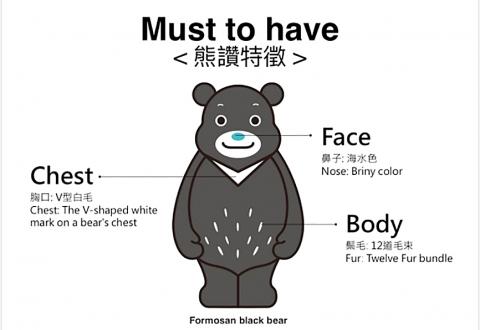The trademark registration for Matsu’s “blue tears” (藍眼淚) — a natural nighttime phenomenon of fluorescent blue patches caused by the algae Noctiluca scintillans that are visible from the shore from April to August — might be canceled, the Intellectual Property Office said yesterday.
The decision might be affected by the case of Bravo the Bear, the Taipei Summer Universiade mascot that has become a Taipei City Government mascot, whose appearance was mildly modified to be more distinguishable to gain trademark registration approval.
The city government applied for a trademark for the second version of Bravo in December last year and is likely to obtain it, but its Chinese name,xiong zan (熊讚), is a colloquial term that is ineligible for trademark protection, office Director-General Hong Shu-min (洪淑敏) said.

Photo: screen grab from Professional Technology Temple
Xiong zan is pronounced similarly to the Hoklo (commonly known as Taiwanese) word for “the best.”
If the name xiong zan cannot be registered, then how can “blue tears” receive a trademark, Democratic Progressive Party (DPP) Legislator Gao Jyh-peng (高志鵬) said.
It is inappropriate for “blue tears” to have word mark protection, Hong said, adding that the office would cancel its registration.
Lienchiang County Government documents showed that “blue tears” was registered for word mark protection, the office said, adding that it has notified the trademark’s owners that the registration would be canceled if they do not propose a solution.
It said word mark protection for “blue tears” was obtained by three people of the county government for usage on four types of products: pastries, tea leaves, popsicles and glass products.
They succeeded in obtaining trademark protection because they applied when the county government was eagerly promoting the “blue tears” for tourism purposes and the name was not yet protected, an office official said.
DPP Legislator Chuang Ruei-hsiung (莊瑞雄) said he is a victim of Bravo, because he used the homonymic term xiong zan (雄讚) for his campaign slogan, but now people only think of the mascot when they hear it.
He asked whether the office had intentionally made it hard for the Taipei City Government to obtain trademark protection for the mascot.
The first version of Bravo is a graphic design that already obtained trademark protection, while the application for the second version is being processed and is likely to succeed, Hong said, adding that the office did not delay the process or make it hard for the city government.
The newly modified appearance of Bravo, which features a distinctive ocean blue nose and white eyebrows, as well as the integration of the Chinese characters for Taipei into part of its name in Chinese, were officially launched at the Taipei International Flora Exposition Expo Dome yesterday.

Twenty-four Republican members of the US House of Representatives yesterday introduced a concurrent resolution calling on the US government to abolish the “one China” policy and restore formal diplomatic relations with Taiwan. Led by US representatives Tom Tiffany and Scott Perry, the resolution calls for not only re-establishing formal relations, but also urges the US Trade Representative to negotiate a free-trade agreement (FTA) with Taiwan and for US officials to advocate for Taiwan’s full membership in the UN and other international organizations. In a news release announcing the resolution, Tiffany, who represents a Wisconsin district, called the “one China” policy “outdated, counterproductive

Actress Barbie Hsu (徐熙媛) has “returned home” to Taiwan, and there are no plans to hold a funeral for the TV star who died in Japan from influenza- induced pneumonia, her family said in a statement Wednesday night. The statement was released after local media outlets reported that Barbie Hsu’s ashes were brought back Taiwan on board a private jet, which arrived at Taipei Songshan Airport around 3 p.m. on Wednesday. To the reporters waiting at the airport, the statement issued by the family read “(we) appreciate friends working in the media for waiting in the cold weather.” “She has safely returned home.

A Vietnamese migrant worker on Thursday won the NT$12 million (US$383,590) jackpot on a scratch-off lottery ticket she bought from a lottery shop in Changhua County’s Puyan Township (埔鹽), Taiwan Lottery Co said yesterday. The lottery winner, who is in her 30s and married, said she would continue to work in Taiwan and send her winnings to her family in Vietnam to improve their life. More Taiwanese and migrant workers have flocked to the lottery shop on Sec 2 of Jhangshuei Road (彰水路) to share in the luck. The shop owner, surnamed Chen (陳), said that his shop has been open for just

MUST REMAIN FREE: A Chinese takeover of Taiwan would lead to a global conflict, and if the nation blows up, the world’s factories would fall in a week, a minister said Taiwan is like Prague in 1938 facing Adolf Hitler; only if Taiwan remains free and democratic would the world be safe, Deputy Minister of Foreign Affairs Francois Wu (吳志中) said in an interview with Italian newspaper Corriere della Sera. The ministry on Saturday said Corriere della Sera is one of Italy’s oldest and most read newspapers, frequently covers European economic and political issues, and that Wu agreed to an interview with the paper’s senior political analyst Massimo Franco in Taipei on Jan. 3. The interview was published on Jan. 26 with the title “Taiwan like Prague in 1938 with Hitler,” the ministry